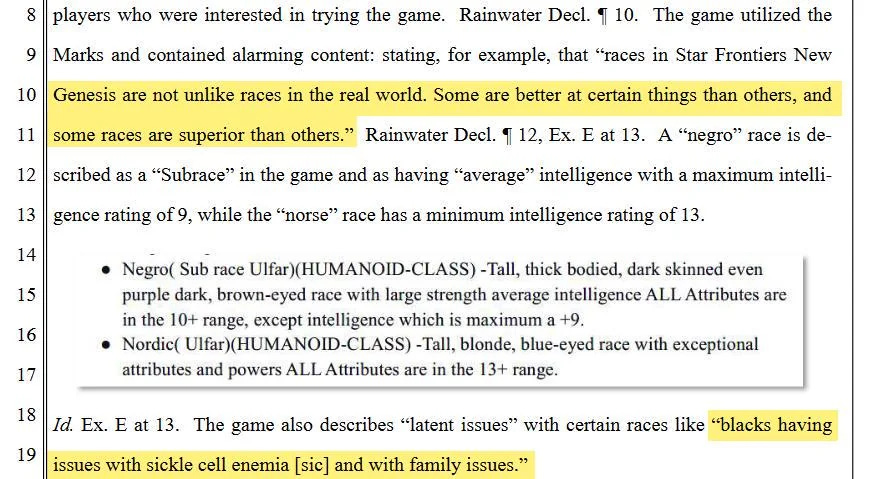If you haven’t listened to it already, I would highly recommend the When We Were Wizards podcast. It’s a 14-episode podcast that discusses the early history of dnd, particularly the figures, relationships, and business aspects of early TSR. It’s extremely well researched and put together, and I think would be good to listen to even if you don’t think you like that kind of thing. Naturally, it focuses a lot on the figure of Gary Gygax.
I entered the hobby in the early 90s with the “Black Box” basic set, followed by the Rules Cyclopedia, followed by AD&D 2e, so my dnd was never Gygaxian dnd. I never had to read Gygaxian prose (though I did steal the library’s copy of the 1e PHP…). My first adventure wasn’t The Keep on the Borderlands. And I certainly didn’t go to any conventions where Gygax & co. would be present. In other words, I knew who he was, but escaped that particular cult of personality.
When We Were Wizards makes clear that Gygax, as a personality, was extremely influential to the development of the hobby—in Lake Geneva, in the pages of Dragon magazine, and at various conventions (and, I suppose, in Hollywood). In the end the podcast is nostalgic for Gygax’s TSR, that small games company that could, as it is eventually taken over by more savvy Lorraine Williams.
This was actually surprising because most of the episodes show Gygax in a much different light, even through the voices of those who admired him. To me he comes across as not just inept at running a business (a befuddled gamer’s gamer, as popular history would have it), but as much worse: narcissistic, selfish, deeply arrogant, exploitative (even of friends and family), and a terrible partner and father. It’s not clear for the entirety of TSR’s run that he ever cares about anything or anyone but himself. One example is that he always insisted that he be paid royalties for his work (by his company that was also trying to make a profit), but always denied his impoverished creative staff the same deal, and in fact never stood up for them or the game he supposedly loved. He seems someone forever lost in his own delusions of grandeur, such that William’s takeover of the company is revealed to in fact be its salvation.
Apartheid Clyde Weighs In
Now, as an adult I have read (some) of the 1e DMG, and Keep on the Borderlands, and other modules, and I can say they are not for me. Meanwhile, everything I learn about him as a person doesn’t endear me to him either. Perhaps, to learn more, I could pick the recently published The Making of Original D&D: 1970-1977, a coffee table history book of some-500 pages published by Wizards of the Coast. Quite daring, I might say, for Wotc to publish such an expensive book on so niche a topic. While I have nothing positive to say about Wotc, you’d think this would at least please the Gen X gamers, to see themselves be catered-to in this way.
You’d be wrong! Apparently this massive book (which includes the entirety of OD&D) also has a page or two disclaimer that some of the material “may reflect ethnic, racial, and gender prejudices that were commonplace in American society at that time.” Of course this is going to immediately make some people defensive, even if, on the face of it, saying that a fantasy imaginary inspired by early and mid 20th century adventure and pulp fiction might have some problematic bits is not so surprising. From it’s founding assumptions, to its portrayal of otherness, to Gygax’s own antiquarian views of gender, there is a lot from the classic era that would have to at least be modified to be seriously published today.
In any case, the far-right-element-of-the-OSR (also known, arguably, as the OSR) got a hold of this on twitter and decided to turn it into a thing, sparking a sudden and oddly-timed condemnation from one Elon Musk, the billionaire whose most recent purchase is the entire U.S. government:
What’s interesting about this is that Musk and others online frame this as an attack on Gygax in particular. And they are vicariously attacked through their attachment to the great Gygax. The king is dead; long live the king: now deceased, Gygax can serve as a means to politically consolidate an entire segment of the hobby around an ‘anti-woke’ stance. I’m not saying this is necessarily a misappropriation of Gygax—doubtless he would have the same reaction were he alive—but rather speaks to the way this segment is itself caught up in a cult of personality. To speak of Gygax now is to invoke not only a whole era of the hobby, not only a stance toward or against ‘old school’ or ‘modern’ dnd, but an entire set of political attachments and positions, in sum a whole political-cultural identity. For some.
Old School Reactionaries
This reactionary segment attaches itself not only to Gary Gygax but to all the “founders” of the hobby (largely friends, family, and a few new hires who happened to be around in TSR’s early days), including Gary’s son, Ernie Gygax Jr. Ernie was someone who has been somewhat in the RPG news the last few years, mostly due the reacquisition of the TSR trademark in 2021. He was working with two individuals, Justin LaNasa and Stephen Dinehart, along with involvement with other ‘originals’ like Jim Ward.
This “NuTSR” positioned itself in the “anti-woke” space in quite an aggressive way, including an interview with Ernie himself making transphobic remarks. The company also worked on a game called “Star Frontiers: New Genesis,” a draft of which was leaked in 2021; as it turned out, it’s pretty white supremacist! In 2021, Wotc also sued TSR, and from this suit we have direct references to some of the language used:
To repeat, the above is not subtle: this is a white supremacist document.
This has come up again recently, because Ernie Gygax has passed away, and thus some have posted to social media calls to honor his legacy. Yet, in some venues (most notably, Reddit), many users have questioned what his legacy amounts to, given how he spent the last several years of his life. Others, like the rpg news site ENworld, have gone full liberal-civility, shutting down any attempts to account for Ernie Gygax’s legacy in a way that isn’t straightforwardly positive.
On those boards, some have defended Ernie by pointing out that it was not he who wrote Star Frontiers, but his collaborators. That’s fair enough, but neither did Ernie Gygax condemn the white supremacy of his business partners in the three and half years since the Star Frontiers draft was leaked. And here, his defenders turn only to platitudes: he ‘had faults like everyone,’ you see, he ‘wasn’t perfect, no one is.’ Or better: he had a child-like innocence, and was duped and used by his nefarious, scheming partners. Or best: he was beginning to turn his life around.
Yet, the lack of accountability is telling in its own way. Because these defenders don’t seem to think that it is particularly problematic to have white supremacist friends or business partners. Doesn’t everyone, they seem to be saying, know someone from work or their friend group who is a little bit of a white supremacist? That Ernie Gygax didn’t immediately condemn this content coming out under his name is not so surprising to them; after all, he wasn’t the one writing it.
As a person of color, the ‘tolerated white supremacist’ is an extremely familiar figure. And forums like ENworld, that choose to pursue what they think of as civility, are ultimately choosing civility over accountability and equality. They are saying that the problematic, bigoted White man is always recuperable and recoverable, even if it has to be at the expense of the minorities who, at the end of the day, are the more expendable parts of their communities.
Drama within any hobby, much less one as small as RPGs, is ultimately stupid. I suppose what I find interesting here is how all this somehow mirrors the brokenness of our larger politics, with its reactionaries, its polite, condescending liberals, its rampant consumerism. No exit, indeed.
Update: here’s where we are with regards to ENworld, I guess…







This was a great read. I’m really glad people are talking about GG’s character more. While he was very important to the hobby (obviously) his faults need to be talked about and his collaborators lifted up in much higher regard than him, seeing as they seemed to actually love the game, the people, and their creations.
Thank you for bravely adapting the same line of rhetoric as every corporation, news media, and brow beating “influencer”. So brave of you.